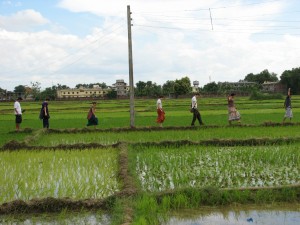Last year’s change in mission age eligibility continues to affect many aspects of BYU culture. In addition to a seeming decrease in the number of female students and freshman, the change has taken its toll on many campus programs, and it looks like the International Studies Program is no exception. The ISP has seen a drop in enrollment of more than 200 students this year and if this trend continues, it may force some smaller study abroad programs to close.
India is one of the smaller study abroad programs at BYU with around 30-50 applicants each semester. However, the missionary age change has hit the program hard.
The program only has one person signed up for a study abroad this summer and three this fall.
“When the change happened in terms of missionary eligibility, the numbers just fell off a cliff,” said Charles W. Nuckolls, director of the India Study Abroad Program.

The India program cannot stay dormant for semesters at a time because that would cause it to terminate all of their leases in the country and fire its employees. Those workers would have to look for employment elsewhere, making it almost impossible to assemble the team again.
“We either have to keep going every semester, every year or we’re dead,” Nuckolls said.
Other administrators are more optimistic.
Though it is difficult to know for sure whether the missionary age change is the reason for the drop in applicants, Lynn Elliott, director of International Study Programs, said he expects the program to “bounce back” when all of these students return from missions.
When Elliott started working as director of ISP nine years ago, there were about 1,000 students going on various study abroad programs. He explained that enrollment has increased almost every year since.
The ISP accepted 1,638 for study abroad during the 2011-2012 academic year, but that number has dropped to 1,399 students during the 2012-2013 academic year.
Further, according to Elliott, BYU’s International Studies Program is operating at about 60–70 percent, making the correlation between study abroad numbers and the increase in sister missionaries even stonger.
“This is typically because men feel like their international experience comes from their missions and the girls tend to go on a study abroad,” Elliott said.
Although there has been a drop, Elliott hypothesises that missions will not affect female’s desire to go on a study abroad after they return from missions.
“I think they will come back and want to go on study abroads just like they did before,” Elliott said.
Amy Twitchell is an exercise science major at BYU who was considering going on a study abroad to either the Jerusalem Center or London. She decided not to go because she was called to serve a mission in Brazil.
“I might still go after my mission,” Twitchell said. “I think (a mission) could increase my desire to study abroad.”




